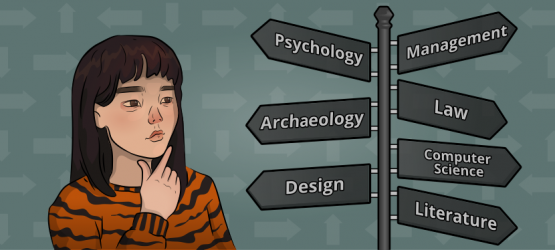15 Study Habits for College Success

Starting your college work is an exciting period packed with opportunities for intellectual curiosity, academic success, and personal improvement. The key to succeeding in college is to establish productive study habits that will enable you to overcome obstacles, do well on assignments, and get the most out of your educational experience.
We’ll dig into the world of study habits and provide you with priceless advice and useful tips for streamlining your educational process. The study habits covered here will provide you the ability to realize all of your goals and succeed academically, regardless of whether you’re a first-year student just getting started or an experienced student trying to improve your strategy.
You’ll find a wide variety of study techniques specifically chosen to meet different facets of the college experience inside these pages. From setting goals to time management, active learning techniques to self-care, each habit is meant to equip you with the abilities you need for success.
We’ll go through not only the fundamentals of taking notes but also how to use technology deftly, locate resources, and strike a healthy balance between work and home life. You’ll enhance your academic performance and gain crucial life skills like organization, discipline, and critical thinking by cultivating these study habits. These behaviors will act as the cornerstones of a successful college experience and lay the groundwork for ongoing learning.
As you begin your life-changing adventure, keep in mind that creating excellent study habits is a process that calls for commitment, flexibility, and introspection. Embrace the thrill of learning, develop a development mentality, and be open to experimenting with novel approaches that fit your learning preferences.
Let’s now explore the realm of productive study techniques and realize your full academic potential. Prepare yourself for a voyage that will influence not just your college career but also your future success.
1. Define Specific Goals
Setting definite, defined goals is essential for successful college studies. Establish your goals for each study session or semester. To stay focused and efficiently measure progress, divide bigger goals into more manageable, smaller tasks. You can stay motivated, organize your efforts, and accomplish your goals if you have a clear sense of direction.
2. Establish a Specialized Study Area
Having a designated study environment is crucial for productivity and focus. Locate a place that is calm and well-lit so you can study without interruptions. To guarantee quick access when needed, arrange your study resources, including books, notes, and reference materials. Your study area should be relaxing, intimate, and distraction-free from things like noise, mess, or interruptions.
3. Set Goals for Time Management
The secret to succeeding in college is efficient time management. Create a time management plan that fits your schedule and study preferences. Make a study schedule using calendars, planners, or mobile applications, allotting enough time for each course and assignment. To avoid burnout and preserve productivity, don’t forget to take pauses. You may maximize your study times and balance your school work and personal obligations by using time management skills.
4. Adopt Active Learning Strategies
Long-term retention is frequently not achieved by passive reading. Utilize active learning strategies to interact with the subject. Participate in group conversations, explain concepts to others, summarize materials, or provide visual aids like mind maps or flashcards. You may improve knowledge and memory by actively engaging with the subject. Try out various active learning techniques to see which one suits you the best.
5. Make Use of Available Resources
Colleges provide a multitude of services to help you succeed academically. To improve your comprehension of difficult subjects, use libraries, writing centers, tutoring programs, and internet resources. Form study groups and collaborate with your classmates to reinforce your lessons and discuss ideas. Be proactive in utilizing the resources at your disposal to augment your studies and increase your knowledge, and ask for help when necessary.
6. Become Proficient at Taking Notes
Create a strategy for taking notes that works for your learning style. Organize your notes, underline important ideas, and shorten text using symbols or abbreviations. Regularly go over and edit your notes to ensure understanding and draw connections between various ideas. Try out several note-taking techniques, such as the Cornell method or the outlining approach, to see which one suits you the best.
7. Make Smart Use of Technology
Utilize technological resources in your study regimen to improve learning. Use note-taking software, productivity tools, online databases for research, and instructional websites to organize your study and gain quick access to information. To ensure that technology helps you with your studies rather than getting in the way of your productivity and attention, be aware of distractions and establish boundaries.
8. Adopt a Healthier Way of Life
For college studying to be as effective as possible, a healthy lifestyle is essential. Get enough rest, eat healthful foods, and work out frequently to increase focus and memory. Reduce anxiety and improve attention by using stress-reduction strategies like deep breathing exercises, meditation, or engaging in hobbies. Setting the basis for academic achievement, and balancing academics with self-care provides a good attitude and general well-being.
9. Examine Yourself
Self-evaluation is crucial for determining your level of comprehension and locating knowledge gaps. Review previous assignments or examinations, practice answering sample questions, and take practice exams. With this strategy, you become accustomed to the exam structure, gain confidence, and solidify your knowledge. You may pinpoint areas that need more focus and change your study techniques by routinely assessing yourself.
10. Seek harmony
Maintaining a balanced life is as vital as investing time in academics. Make time for self-care activities, hobbies, and social interactions with friends. Achieving a balance between work and play enhances concentration, creativity, and general well-being. Aim for a balanced approach that fosters both your academic aspirations and personal development.
11. Welcome Active Review Sessions
Periodic review sessions may be a great addition to your study schedule in addition to regular studying. Set aside time specifically for reviewing previously learned information so that concepts are reinforced and long-term retention is achieved. Use active review strategies like concept mapping, self-quizzing, and speaking concepts out loud to oneself. This proactive approach aids in consolidating information, filling in any gaps, and preserving a thorough comprehension of the subject.
12. Create Effective Study Strategies for Different Subjects
Study methods may need to differ depending on the subject. Practical experiments and practice tasks are crucial for topics like math and physics. In contrast, reading and critical analysis may be required more for disciplines like literature or history. Make sure your study methods are specific to the needs of each topic by using methods that are in line with the content’s style to improve understanding and mastery.
13. Encourage productive study groups
Working with classmates in a study group can improve your learning. Participating in class discussions and exchanging ideas with your peers exposes you to many viewpoints and enables a deeper examination of challenging subjects. Each participant in study groups may share their knowledge, dispel ambiguities, and offer helpful support. To make the most of your collective study sessions, though, make sure that your study group remains concentrated and productive by setting clear objectives and a well-organized schedule.
14. Make Use of Visualization Techniques
Visualization is a potent memory aid. When learning intricate procedures or linked ideas, visualize the knowledge using diagrams or mental representations. Consider how the parts fit together or the order of the actions. As an alternative, you may create diagrams or employ digital technologies to make these graphical representations more concrete. You may improve your memory and comprehension of complex information by using your visual memory.
15. Prioritize Self-Care and Stress Reduction Techniques
College life may be taxing, so it’s important to give these practices a top priority. Recognize the symptoms of burnout or excessive stress, then contact counseling services or support groups that your college offers for assistance. To retain attention and achieve academic achievement, it is crucial to look after your mental and emotional health.
All in all, you can improve your college learning by putting these extra study habits into practice. Always remember to customize these techniques to fit your learning preferences and style. Try out various methods, hone your study strategies over time, and keep an open mind to new ideas. You’ll be prepared to succeed academically and maximize your college experience with commitment, consistency, and a development mentality.
Conclusion
Success in college depends on developing efficient study techniques. You can make the most of your learning process by establishing clear goals, creating a comfortable study environment, controlling your time wisely, participating in active learning, employing available resources, embracing a healthy lifestyle, practicing efficient note-taking, utilizing technology, self-assessing, and looking for balance. Keep in mind that developing these habits requires commitment, self-control, and customization to your situation. Accept them as lifetime abilities that will help you with your college academics as well as set you up for future challenges and personal development. We wish you success in your academic aspirations!










